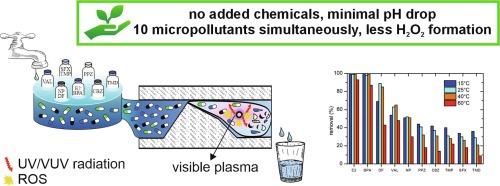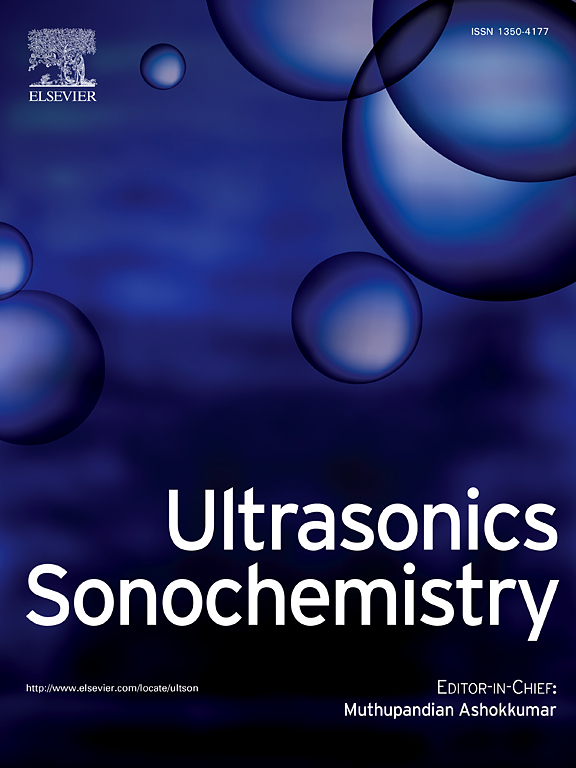Proof-of-concept for removing micropollutants through a combination of sub-atmospheric-pressure non-thermal plasma and hydrodynamic (super)cavitation
IF 8.7
1区 化学
Q1 ACOUSTICS
引用次数: 0
Abstract
The persistence and toxicity of hazardous pollutants present in wastewater effluents require the development of efficient and sustainable treatment methods to protect water resources. In this study, the efficacy and efficiency of a novel combination of two advanced oxidation processes – sub-atmospheric-pressure plasma and hydrodynamic cavitation – were systematically tested for the removal of valsartan (VAL), sulfamethoxazole, trimethoprim, naproxen, diclofenac (DF), tramadol, propyphenazone, carbamazepine, 17β-estradiol (E2) and bisphenol A (BPA). The results show that both sample temperature and plasma power play a role and the highest removal, from 29–99 %, was achieved at 25 ℃ and 53 W of plasma power. E2, BPA, DF, and VAL were removed to the highest degree. These results are particularly important in the case of E2 and BPA, whose harmful environmental effects may start to occur already at sub-ng/L to µg/L levels. The differences in the removals obtained depend strongly on the physicochemical properties, and the compounds with the highest logKOW were removed to the highest extent. The energy yield, in terms of plasma power, was between 1 and 26 mg/kWh under optimal experimental conditions. Our results show that the novel plasma-cavitation treatment shows potential that could prove valuable for upcoming regulatory requirements.

通过亚大气压非热等离子体和流体动力(超)空化相结合去除微污染物的概念验证。
废水中有害污染物的持久性和毒性要求开发高效、可持续的处理方法,以保护水资源。在这项研究中,系统测试了亚大气压等离子体和流体动力空化两种高级氧化工艺的新型组合在去除缬沙坦(VAL)、磺胺甲噁唑、三甲双胍、萘普生、双氯芬酸(DF)、曲马多、丙吡酮、卡马西平、17β-雌二醇(E2)和双酚 A(BPA)方面的功效和效率。结果表明,样品温度和等离子体功率都有影响,在 25 ℃ 和 53 W 等离子体功率下,去除率最高,从 29% 到 99%。E2、BPA、DF 和 VAL 的去除率最高。这些结果对 E2 和 BPA 尤为重要,因为它们对环境的有害影响可能在亚微克/升至微克/升水平时就已开始出现。去除率的差异在很大程度上取决于理化性质,logKOW 最高的化合物去除率最高。在最佳实验条件下,以等离子功率计,能量产量在 1 至 26 mg/kWh 之间。我们的研究结果表明,新型等离子体-空化处理技术具有很大的潜力,可以满足即将出台的法规要求。
本文章由计算机程序翻译,如有差异,请以英文原文为准。
求助全文
约1分钟内获得全文
求助全文
来源期刊

Ultrasonics Sonochemistry
化学-化学综合
CiteScore
15.80
自引率
11.90%
发文量
361
审稿时长
59 days
期刊介绍:
Ultrasonics Sonochemistry stands as a premier international journal dedicated to the publication of high-quality research articles primarily focusing on chemical reactions and reactors induced by ultrasonic waves, known as sonochemistry. Beyond chemical reactions, the journal also welcomes contributions related to cavitation-induced events and processing, including sonoluminescence, and the transformation of materials on chemical, physical, and biological levels.
Since its inception in 1994, Ultrasonics Sonochemistry has consistently maintained a top ranking in the "Acoustics" category, reflecting its esteemed reputation in the field. The journal publishes exceptional papers covering various areas of ultrasonics and sonochemistry. Its contributions are highly regarded by both academia and industry stakeholders, demonstrating its relevance and impact in advancing research and innovation.
 求助内容:
求助内容: 应助结果提醒方式:
应助结果提醒方式:


